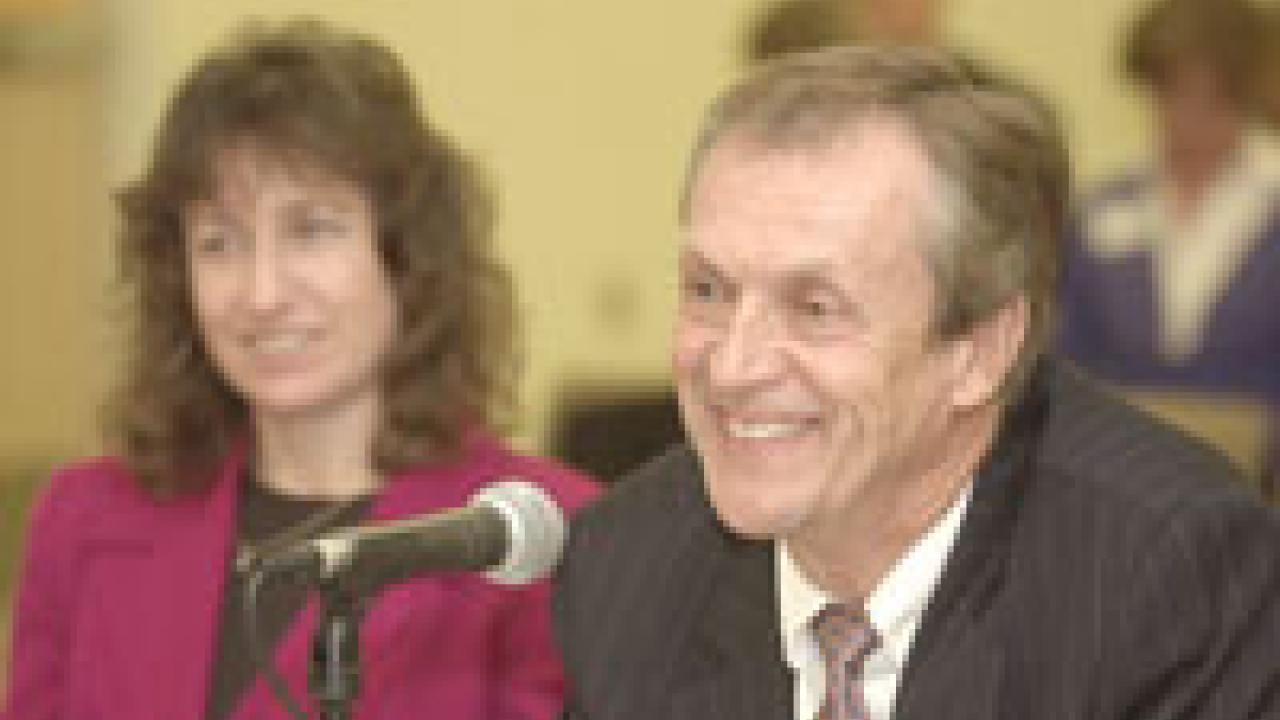Robert C. Dynes, a first-generation college graduate who went on to become a distinguished physicist and chancellor of UC San Diego, was named the 18th president of UC on June 11 by the UC Board of Regents.
He will become president of the 10-campus UC system on Oct. 2, succeeding Richard Atkinson, who is retiring from the UC presidency after eight years.
Dynes came to UC San Diego as professor of physics in 1991 after a two-decade career in the private sector and was named chancellor in 1996. He was selected from a national pool of more than 300 candidates. The recommendation was made by a regental selection committee that was assisted by advisory committees of faculty, staff, students and alumni.
Regents chair John Moores praised Dynes' leadership sensibilities regarding UC quality and accessibility. "He brings the perfect mix of skills and experiences," Moores said.
Dynes is a favorite among the UC chancellors, said Chancellor Larry Vanderhoef. "He is a smart and dynamic leader, with a finely honed sense of humor. As an elected member of the National Academy of Sciences and with an active research program, he has instant credibility with the faculty." And there's an added bonus, he said. "Bob is a recognized expert on the national laboratories, an important talent these days for the UC president. There's no doubt the university will be in good hands."
Dynes, 60, is an expert on semiconductors and superconductors who spent a 22-year physics career at AT&T Bell Laborator-ies before coming to UC San Diego, where he has continued his research and teaching while serving as chancellor. Dynes pledged his commitment as president to high-quality teaching, research that serves the public interest, expanded educational opportunity and institutional accountability.
"I am a first-generation college graduate whose life was transformed by educational opportunity," the Canadian-born Dynes said. "As an immigrant, I came to America because of my belief that anything is possible in this country if you work hard and apply yourself. As a physicist, I have a passion for discovering new ideas, and an even greater passion for watching my students discover new ideas. Last but not least, I am a Californian, and I am as dazzled by this radiant and richly diverse state now as I was when I arrived 12 years ago."
Under Dynes' chancellorship at UCSD, faculty and student quality remained high, academic breadth expanded, ambitious management goals were met, and the campus addressed many key California and national issues.
During his time as UCSD chancellor, student enrollments grew 25 percent and graduation rates remained high; a new pharmacy school and management school were established; freshman seminar offerings were expanded; a new undergraduate college was established; outreach programs were expanded; research expenditures increased 36 percent; the California Institute for Telecommunications and Information Technology was launched with UC Irvine; income from technology transfer increased 76 percent; an initiative to improve staff retention and support started; and a $1 billion fund-raising campaign began, of which nearly half has been raised.
UCSD ranks sixth among American universities in federal awards for research, seventh in the number of faculty elected to the National Academy of Sciences, and seventh among public universities in the U.S. News and World Report rankings.
"I could not be more pleased to have Bob Dynes succeed me as president," Atkinson said. "He is a first-rate scholar, a highly capable manager and a deeply compassionate individual."
Dynes also is intimately familiar with the three national laboratories UC manages for the federal government. He is vice chair of the UC President's Council on the National Laboratories and a member of the Los Alamos National Laboratory Oversight Board. In addition, he has had a 25-year association with the national laboratories as an adviser and consultant to the physics research and weapons programs.
The regents approved a salary of $395,000 per year for Dynes, consistent with the average presidential salary of UC's public comparison institutions.
A self-described "lower middle-class kid who almost chose an ice hockey career over college," Dynes grew up in London, Onta-rio, Canada, and is a naturalized U.S. citizen. He holds a bachelor's degree in mathematics and physics from the University of Western Ontario and master's and doctorate degrees in physics from McMaster University.
At Bell Laboratories, Dynes served as department head of semiconductor and material physics research and director of chemical physics research. At UC San Diego, he founded an interdisciplinary laboratory where chemists, electrical engineers and private industry researchers, joined by graduate and undergraduate students, investigate properties of metals, semiconductors and superconductors. His numerous scientific honors include the 1990 Fritz London Award in Low Temperature Physics and his 1989 election to the National Academy of Sciences.
Dynes said UC must work in "vigorous partnership" with the state's other segments of public higher education. The university must also continue its efforts to expand the concept of "R & D" to "R, D & D" -- meaning "research, development, and delivery" -- to ensure that research innovations end up in the hands of people who will use them.
"We must move discoveries from the bench to the public domain more effectively," Dynes said. "And we must hand them off more quickly to end-users, whether they are first responders in a crisis, farmers, health care professionals, social workers or teachers."
Dynes also said UC undergraduates will remain a high priority for him. "I believe their education is the single most important thing that this university does, and their future achievements will be our most lasting legacy," Dynes said.
UC enrolls some 200,000 students and employs some 160,000 faculty and staff.
